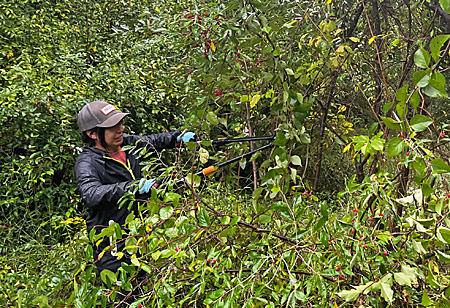The forecast called for light rain on Saturday morning, October 7. For once the forecast was correct, and it did rain. But it did not deter the 12 volunteers who showed up for the work day.

Cutting branches from Autumn Olive.
Photo by Jocelyn Lewis
We divided into two groups. A team of four people was split off to work on the three planting areas where rescued native plants had been planted in 2021 and 2022. The team began with the most recent planting area. The first task was to remove Mile-a-minute, an invasive vine. During the summer, many vines had been removed, but we discovered plenty of small ones that were already setting fruit. We also tackled removing seed heads from large clumps of foxtail grass, an annual invasive. However, with the rain picking up, we had to move on to the second task: planting more natives. The plants that had been dug the previous day had to go in the ground, and there were nearly 40 pots of plants that had been propagated from seeds collected last year at JK Black Oak. The volunteers stuck it out in the rain to get them all planted. By that time everyone was soaked and muddy, and the rain showed no signs of stopping. We decided to call it quits.
The second group worked on habitat restoration around the Spring Peeper vernal pool. This shallow depression was slowly being taken over by about a dozen Autumn Olive shrubs and several Multiflora Roses. Armed with loppers, a saw and a shovel we started to remove these invaders. Although it was raining a little harder, the volunteers seemed to have a lot of fun lopping off large branches from the shrubs. By around 10:00 am we had removed all the Autumn Olive and Multiflora Rose. The area around the vernal pool is now more open and should provide additional habitat for pollinators when the native plants return next year. The removed invasives were used to build a large brush pile that can be enjoyed by many species this winter such as amphibians, mammals and birds.
Of course, the rain stopped after we were done with the work day. However, the wind picked up and that would have been pretty miserable in our wet clothes.

